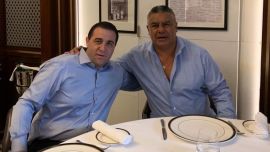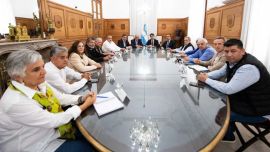“He was a friend to all of us,” wrote Mark Malloch Brown, once his deputy secretary-general, “and like me I’m sure you, David, consider working for Kofi to have been the privilege of a lifetime.”
Indeed yes. Indeed it was a privilege to have worked with Kofi Annan. Not because he was some kind of saint. Not because he was flawless, indeed he himself owned up to his mistakes in a way that now seems rare. Certainly not because he was somehow ‘the Diplomat’s diplomat’, as one obituary writer concluded, leaving me mystified as to what that really meant.
No. Kofi Annan was a humanitarian, in the best sense of the word. Kofi made it his business to speak for humanity. Kofi assumed good intent, always, of those he dealt with. He never had a bad word for anyone. As UN secretary-general he had instant access to almost anyone in our world, but he always thanked you for taking his call. Kofi remained true to his humble self, despite the trappings of power and influence.
I will never forget the day he asked me to work for him. He had known me for years. I’d met him back in the early 1980s, when I reported on heart-breaking famines in Uganda and Ethiopia, and he was working on refugee issues. In the early 1990s, when he led UN Peacekeeping Operations, I made a fly-on-the-wall film with him at UN Headquarters as peace missions to the likes of Somalia and Rwanda imploded.
A decade later, as the Bush/Blair invasion of Iraq became a quagmire, he stepped away from the microphone one day in New York, asked me to walk with him, and said he’d like me on his team. I remember telling my wife Sonia: “You can’t say No to the UN secretary-general.”
The job was in Washington DC, where he had a problem named George W. Bush. President Bush concluded, rightly, that Secretary-General Annan was deeply opposed to the occupation of Iraq, and represented the most important naysayer on the world stage, indeed the only one of stature. Annan didn’t hide it, calling the Iraq war “illegal.”
Within a few weeks of taking charge of the UN’s small liaison office in Washington, representing the organisation before the US Congress, the State Department and the White House, the secretary-general was embroiled in a scandal involving a byzantine programme called Oil-for-Food in Iraq. Forget about the detail, which was mind-boggling, or that the United States had monitored the programme’s every move. The Bush administration made it an issue, and columnists briefed by the White House accused Annan’s son of making money out of it.
As a result, the secretary-general had a crisis on his hands, and our relationship quickly became that of boss and adviser. There were difficult conversations. There were moments of agreement, and disagreement, on how best to confront the threat. There were awkward silences in meetings in the Oval Office, certainly on Capitol Hill where looks coming from certain Republicans could kill, and then press stakeouts that became interrogation sessions.
At one point Republicans in the House of Republicans tabled a motion for a vote of no-confidence in him. It was my job to spell it out for him, knowing that he would almost certainly be forced from office if the US Congress, the UN’s largest financial contributor, said they had no confidence in him.
Curiously, I didn’t dare tell him that I was about to go ‘lobby’ the big guns in the Republican Party – Senator John McCain the chief one – to head off the vote. Kofi, I knew, would say that the UN didn’t ‘lobby’ in Washington or any capital for that matter, as a matter of principle. My old friend McCain came through. That vote never reached the floor.
The longer it went, the more I grew to admire my boss. He would go see President Bush, and keep the conversation about humanity. He would greet his enemies on Capitol Hill with such disarming courtesy, and honesty, stressing common cause. He would sit down for exhaustive TV interviews about his leadership with such patience.
As for the scandal, I knew he hadn’t taken a cent, as an independent enquiry led by a senior US official (one Paul Volcker, ex-chairman of the Federal Reserve) concluded. His son had behaved badly. “You’re guilty only of loving a son too much, Sir,” I said to him one morning as we waited for a meeting in the US Senate. “Join the rest of us.” He smiled, but it was the smile of a man who felt condemned. Sometimes, riding to and from the airport, he would wonder aloud beside me about whether his legacy would be couched, always, with a headline suggesting scandal.
I failed to reassure him otherwise back then. But in the days since he died, sad as it has been, I was relieved to see the headlines, and the first take highlighting Kofi Annan’s work, his leadership, his grace, his deep sense of humanity. At a time of such dubious leadership in our world, and that’s putting it mildly, Kofi’s legacy shines bright, despite his own admission of his own failings.
We spoke down the years. It remained a privilege to have his ear. A while ago, about to go to Havana to sit down with the FARC rebels behind a 40-year civil war in Colombia and help peace negotiations, he recalled a conversation I had with him about visiting the rebels in my journalism years. I encouraged him to think of them as single-track negotiators who felt that negotiation was all about them taking, and the Colombian Government giving. The following week, I saw my old boss emerge from a session with rebel leaders in Havana, go to the microphone, and declare that some could face war crimes, and face justice accordingly. The rebels signed on to a deal shortly afterwards, digesting his warning.
That was Kofi Annan at his best, using the only weapon in his armoury. The microphone. And using it on behalf of humanity.
RIP boss. My friend. At such a moment in our world,
you will be missed.related news

'Illegal': Iran slams Argentina bid to arrest minister over 1994 AMIA attack

Argentina seeks arrest of Iranian minister over 1994 AMIA bombing

Argentina's Foreign Minister Diana Mondino heads to China, Europe on investment quest

Top US official James Rubin: 'China is supporting Russia's war in Ukraine and repeating its crazy arguments'
















Comments